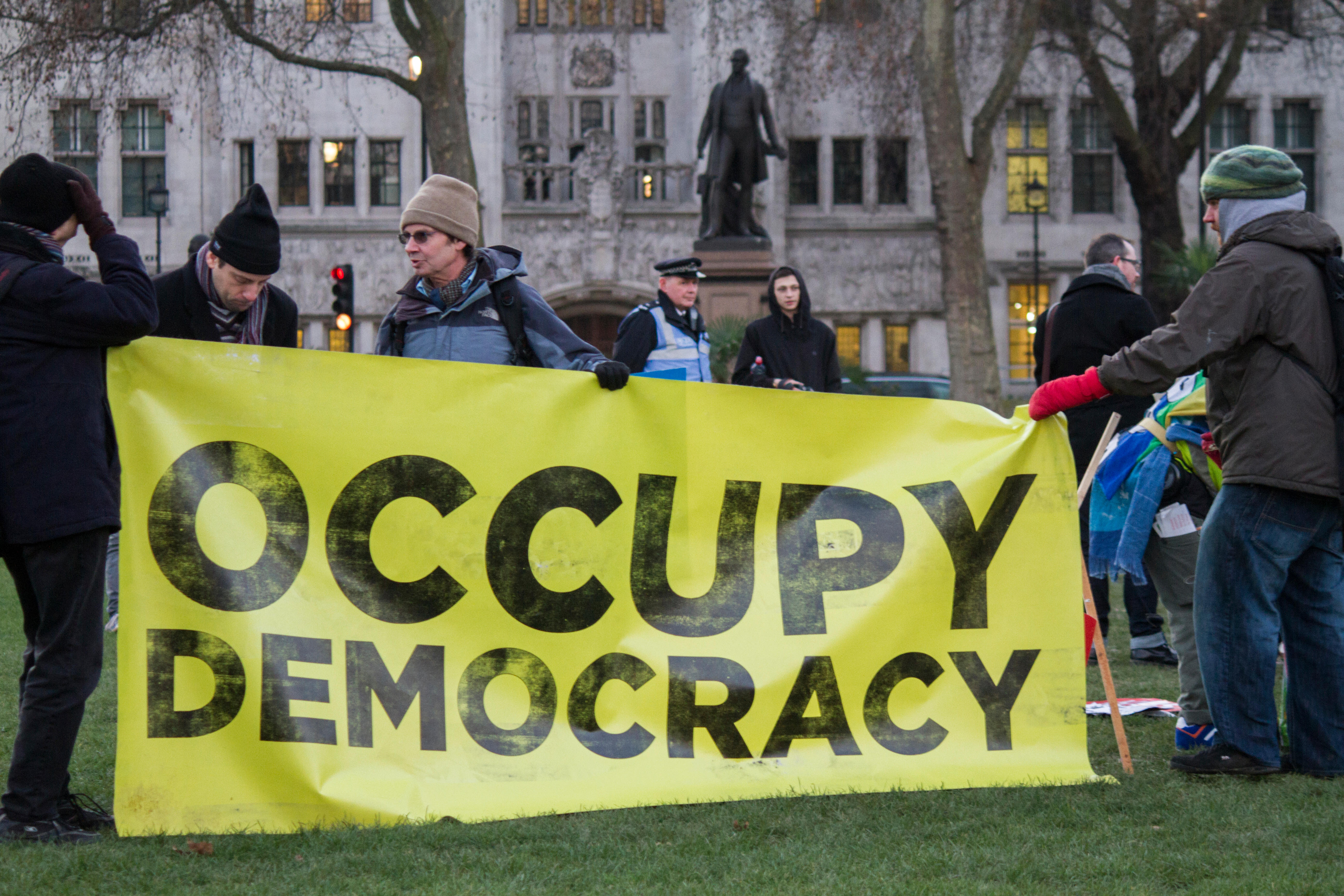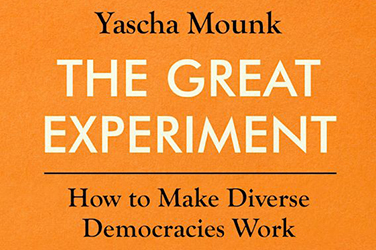
- Free Article: No
- Contents Category: Politics
- Review Article: Yes
- Article Title: The spiral of ideology
- Article Subtitle: An optimistic look at the future of democracy
- Online Only: No
- Custom Highlight Text:
This is an optimistic book about the future of democracy in diverse societies. Yet optimism about democracy is a scarce commodity in 2022. Engaging with the prevailing pessimism forms the basis of Yascha Mounk’s prognosis for democracy in diverse societies. This makes it a worthwhile book, despite some absences in the analysis.
- Article Hero Image (920px wide):

- Article Hero Image Caption: Protesters demonstrate their right to protest on Parliament Square during Occupy Democracy in London, 2015 (Samuel Bay/Alamy)
- Featured Image (400px * 250px):

- Alt Tag (Featured Image): Ben Wellings reviews 'The Great Experiment: How to make diverse democracies work' by Yascha Mounk
- Book 1 Title: The Great Experiment
- Book 1 Subtitle: How to make diverse democracies work
- Book 1 Biblio: Bloomsbury, $29.99 pb, 356 pp
Some of these ideas to make diverse democracies work are worthy but easier said than done. Mounk’s prescriptions include: making everyone wealthier in a sustainable way; providing a generous and supportive welfare state; creating and sustaining political institutions that support meaningful participation for active citizens; and fostering a culture of mutual respect. All of these things are undoubtedly desirable, but how to make them possible is less well explained.
It is worth drawing attention to one assumption that underpins Mounk’s analysis and hence the policy suggestions in this book: that democracy functions best under conditions of national homogeneity. This idea has a long provenance – it can be found in early liberal writings on democracy – and has provided an unspoken frame for much thinking about, and practice of, democracy since. But beyond this, and at a tactical level, Mounk’s analysis points to an interesting revival of ideas from the more optimistic 1990s: that progressives should not abandon the idea of the nation to conservatives, betting on the nation’s imminent demise. As George Orwell pointed out in the 1930s, this is something they have been doing (in vain) for a long time. Instead, Mounk suggests that a revived nationalism based on liberal ideas of mutual respect and empathy might be the basis for a meaningfully shared public realm.
Mounk’s goal is a worthy one. This remains true even if the depiction of what this might look like can sound trite: the idea of a ‘group of friends drawn from every racial and religious group [getting] drunk at a Tex-Mex bar whilst “Old Town Road” blares from the speakers’ as ‘the future we should aspire to’ diminishes the intent. But the goal is worth adhering to. ‘The project of making diverse democracy thrive is the project of building a meaningfully shared life,’ he writes. ‘It is therefore more likely to succeed if we build deeper connections, empathy and solidarity between different groups.’
In this regard, Mounk moves beyond the concepts of ‘the melting pot’ and the ‘salad bowl’ (the ideas engaged with in this book are principally drawn from US debates) towards what we might call an empathetic nationalism. Here he introduces the metaphor of the civic nation as a ‘park’ where members of diverse groups can participate in conditions of equality, opting in when they like but able to seek the support of their group as they need, yet all within the boundaries of the park.
Importantly, Mounk asks us to work with, rather than against, the grain of the human tendency to form groups. Diversity for Mounk means ethnic and religious diversity. Gender, a major cleavage in intra-group inequality, is little considered in this book. Furthermore, ‘the park’ appears to be a place where there is an optimal level of equality, which is not something that characterises liberal democracies today. Since the Global Financial Crisis in 2008, citizens have all been ‘in this together’, but only in the sense that although everyone on a plane is in the same aircraft, some people are in business class.
Mounk’s ideas for how to attain a meaningfully shared public life, set out in the final chapter, encourage us to seek connection with those who are different from us, politically as well as ethnically or religiously. Here we might make a distinction between fearful and hateful people. Hateful people will be beyond reach, but fearful people can be assuaged. We can create a meaningfully shared nation if we can overcome people’s fears through lived experience.
This may underestimate the extent of political polarisation. What if the other side is not as committed to liberal, pluralistic ideas – or even democracy itself – as ‘our’ side? It also places the citizenry in a state of permanent politics. In this mode, citizens are asked to do a lot of the policing of political boundaries. The personal has indeed become political and it can take its toll. There is only so much politics people can take. It might also be that diversity per se is not what makes democracy difficult. Australia is hyper diverse and, when viewed comparatively, functions well. The real problem might be people and organised groups who reject pluralism – the foundational condition for democracy.
Stylistically, the writing in The Great Experiment can be annoying. Mounk has a tendency to support claims with statements such as ‘from India to Brazil’ or ‘from France to Japan, and from Germany to the United States’, when presumably he means ‘in India and Brazil’ and ‘in France, Japan, Germany and the United States’. Such rhetorical devices don’t lend his overall argument an air of authority.
But it is important to end on an optimistic note. It is hard being an optimist. In comparison, pessimists have it easy: pessimists only need to be right once to have their world view confirmed; the optimist must be right all the time. Mounk has taken on this challenge and should be supported. Nations belong to progressives as well as conservatives. Tolerance must have its limits: liberal democrats are fully justified in opposing illiberalism and authoritarianism. Racism and xenophobia are no good for anyone: obviously not for those who experience such prejudice, but neither for racists who have to carry hate and anger around with them at all times, ready to police some racialised social boundary.
It is easy to be pessimistic about democracy today. Yet history reminds us that democracy itself was fashioned out of conditions of stark inequality and deep polarisation – in fact it emerged from the struggles against inequality and polarisation. Democracy contains within it the seeds of its own propagation.


Comments powered by CComment